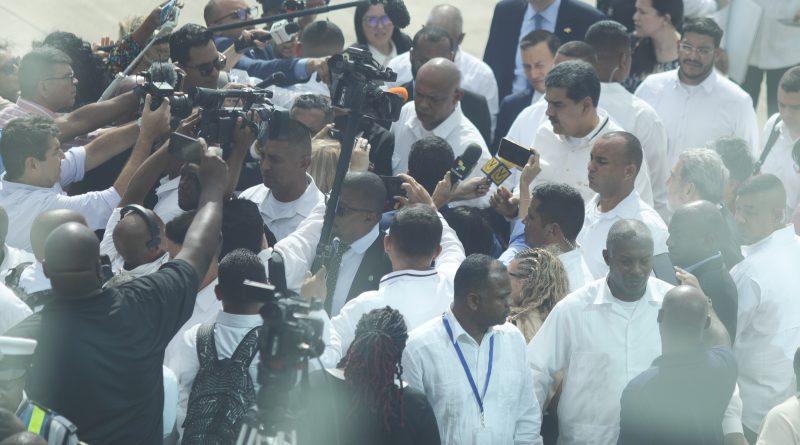The position of the Bolivarian Republic of Venezuela has been unwavering regarding the controversy over the territory of Guayana Esequiba.
What the Venezuelan President pointed out a few days ago about Guyana having to sit down and talk, today is a fact with the high-level meeting that took place in Kingstown, Saint Vincent and the Grenadines, and that was headed by the leaders of Venezuela and Guyana, Nicolás Maduro and Irfaan Ali, respectively.
In this case, historically, Venezuela has confirmed that it wants peace and understanding, and the Venezuelan Head of State has said that his government, from the heart and soul, wants “by the good ways, everything” and “with the Geneva Agreement, everything.”
But what does the Geneva Agreement say?
This agreement to resolve the controversy between Venezuela and the United Kingdom of Great Britain and Northern Ireland over the border between Venezuela and British Guiana, maintains:
“The Government of Venezuela and that of the United Kingdom of Great Britain and Northern Ireland, in consultation with the Government of British Guiana, Considering the upcoming Independence of British Guiana; recognizing that closer cooperation between Venezuela and British Guiana would be of benefit to both countries, Convinced that any pending dispute between Venezuela on the one hand, and the United Kingdom and British Guiana on the other, would prejudice such collaboration and must, therefore, be amicably resolved in a manner acceptable to both parties; in accordance with the Agenda that was agreed upon for the government talks relating to the controversy between Venezuela and the United Kingdom over the border with British Guiana, according to the Joint Communiqué of November 7, 1963.”
In this regard, the Venezuelan Dignitary argues that, when signing the Geneva Agreement, established on February 17, 1966, the United Kingdom recognized – directly – that there is a pending territorial dispute over Guyana Esequiba, an action that shows the illegal nature of the Arbitration Award of 1899.
“With the signing of the Geneva Agreement, the Kingdom of Great Britain, the occupying colonial power, accepts the controversy that Venezuela had been raising in the 20th century. It is a core element, which leaves the Arbitration Award aside, because if Great Britain had considered that it was not an element of discussion, it would not sit down to negotiate, it would not sit down to debate, it would not sign the Geneva Agreement,» as highlighted President Nicolás Maduro.
Recently, he recalled that the negotiation process has its genesis in the speech of Marcos Falcón Briceño, former Minister of Foreign Affairs of Venezuela (1960-1964), where he claimed – with historical, political and diplomatic elements at hand – Venezuela’s rights over Guyana Esequiba at the 348th Special Policy session of the United Nations on November 12, 1962:
“From there began the intense process of conversations, negotiations and the signing of previous documents that are of fundamental importance because, in these negotiations, the Kingdom of Great Britain recognized directly and indirectly that there was a pending controversy over Guyana Essequiba”, stressed the Venezuelan president.
Precisely, the Geneva Agreement establishes, from the point of view of international law, that there is a pending controversy that has not been resolved in any previous agreement or document “and that must be resolved through diplomatic and peaceful means.”
The Prime Minister of the host country (Saint Vincent and the Grenadines), Ralph Gonsalves, has maintained that “given the events and circumstances surrounding the territorial dispute (…) we have evaluated, in the interest of all (…), the urgent need to defuse the conflict and institute an adequate dialogue, face to face, between the presidents of Guyana and Venezuela.
«Both (presidents) have shown themselves in favor of this position in the search for peaceful coexistence,» said Gonsalves in the context of the high-level meeting between presidents Nicolás Maduro and Irfaan Ali, which is promoted by the Community. of Latin American and Caribbean States (CELAC), of which Gonsalves is pro-tempore president, and the Caribbean Community (CARICOM).
